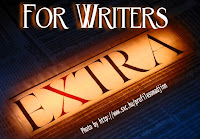 I've read many discussions over the years about authors who discover a publishing contract doesn't mean what he/she thought it meant.
I've read many discussions over the years about authors who discover a publishing contract doesn't mean what he/she thought it meant.I heard another example of this recently then I happened to watch a Judge Judy episode with a case determined by what the contract said because in most cases--I hesitate to say all because there may be an exception--what the contract says determines the outcome.
So I thought I'd take this opportunity to give 3 simple rules about contracts, and this applies to any contract from a book publishing contract to a contract to buy a car or to join a gym.
3 Simple Contract Rules
 1. If it's not in the contract, then it means nothing.
1. If it's not in the contract, then it means nothing.2. You must read the entire contract.
3. You must understand the entire contract.
If you haven't followed these 3 rules, do NOT sign the contract.
What's In the Contract
If you and an editor or a car salesman discussed any benefit if you sign on the dotted line, and that is not stated in the contract, it doesn't count. Only what is in the contract is legal. If there's something you've been promised, then don't sign until the contract has been revised to represent that.
Read the Entire Contract
Read the entire contract? Yes!! Every sentence. Yes, it takes time, and the gym rep is rushing you, but take the time--no matter how long--to read the contract before you sign.
If you're signing a contract with a literary agent, the same holds true. This way you can ask questions about elements you may not understand.
Understand the Entire Contract
If you don't understand something, ask questions. I'm amazed how many people see doctors and never ask questions. The same holds true for contracts. It's as if people who aren't lawyers are embarrassed to ask questions about what happens to any funds due you if the agent dies suddenly. Or, what happens to your royalties and your book if the publisher shuts down. Or any number of other things with which you should be concerned.
Ask questions unless you're an attorney who knows about intellectual property law. You need to remember, you are protecting yourself and your assets. If you get hassled about asking questions, then that's a red flag. Walk away.
Some traditional publishing contracts are long and can be hard to understand. If you belong to any group that offers contract advice like Authors Guild or even RWA, contact them with your questions.
There are many books out there (check Writers Digest Books) on understanding contracts. Educate yourself even if you eventually plan to get an agent to work for you.
Takeaway Truth
An informed writer is a writer who is less likely to be taken advantage of.



No comments:
Post a Comment